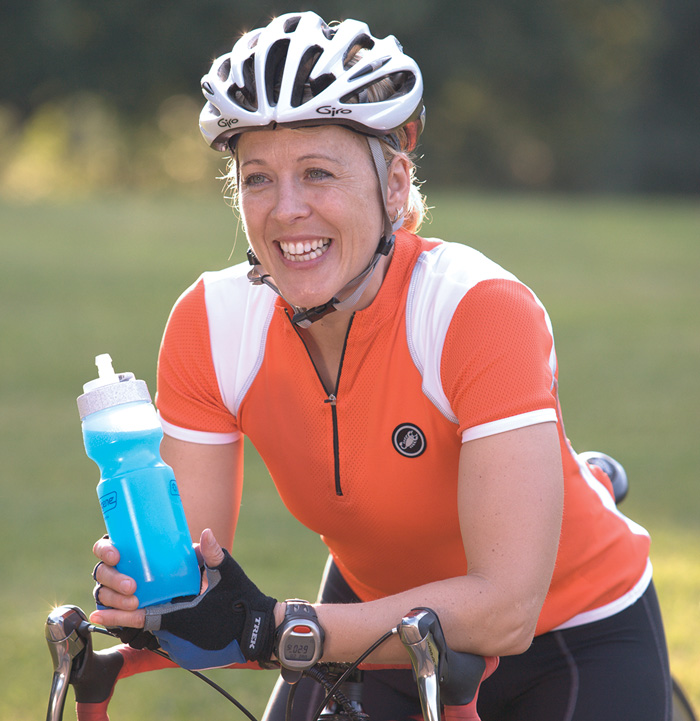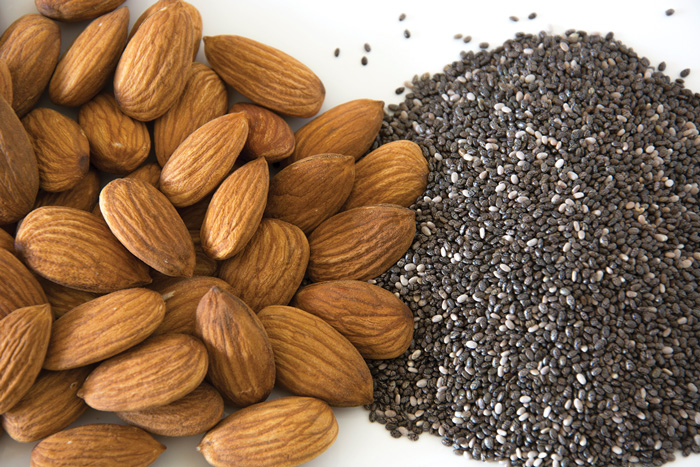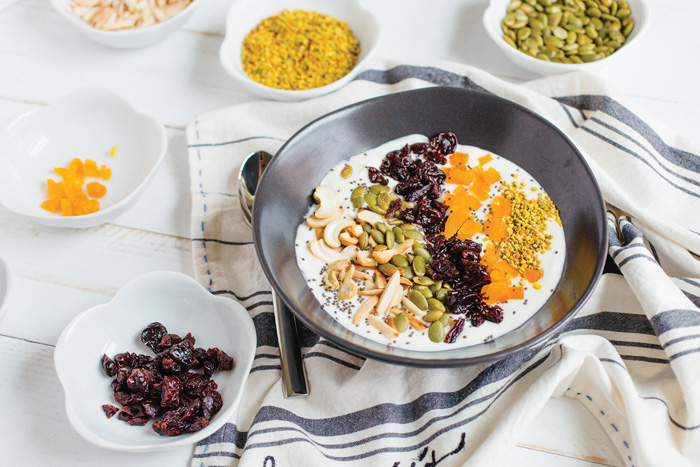Sporting Wellness
NUTRACEUTICALS
Everyone from athletes and fitness enthusiasts to weekend warriors and active consumers comprise today’s sports nutrition market. Their nutritional needs and diets vary with their different fitness concerns and goals. Some are looking for energy during workouts or better recovery afterwards while others target muscle building, joint protection, and even immune health. Here is a look at some of the ingredients that have been shown to benefit these areas.
Immune Health
Although immune health was already an emerging area within the sports nutrition market, with COVID-19 at the forefront of everyone’s minds, even for athletes, it will be a top concern. For athletes and fitness enthusiasts, immune systems can be affected after rigorous workouts and training sessions.
“A global consumer survey conducted by DuPont in 11 countries indicated that maintaining immune health is a key concern for sports performers and it is as important as muscle building,” says Stephanie Udell, global marketing lead – probiotics, DuPont Nutrition & Biosciences. She explains that prolonged intense exercise is associated with a temporary depression of several aspects of both innate and acquired immunity, the so called “open window.” “During this time of decreased protection, viruses and bacteria may gain a foothold, increasing the risk of infection, particularly upper respiratory tract infections (URTI) – cold and flu.”
DuPont offers HOWARU Protect Sport probiotic that is clinically shown to help physically active adults stay healthy, allowing more time for exercise. The product is comprised of Bifidobacterium lactis Bi-07 and Lactobacillus acidophilus NCFM. Udell notes that with HOWARU Protect Sport a 0.9 mo delay of median time for first incidence of respiratory infections and 0.5 hr increase in weekly exercise duration was observed compared to placebo (West et al. 2014).
Weakened immune systems for athletes not only increase vulnerability to infections but can also increase the risk of missed training sessions and other longer-term health issues. Consumers now understand that not only do muscles need time to recover, but so do the immune systems (Kerry 2019). A yeast β-1,3/1,6 glucan, Wellmune (Kerry), has also been shown to help athletes. The company explains that when it is consumed, Wellmune is taken up in the body by the Peyer’s Patches in the intestines. Macrophages in the Peyer’s Patches ingest Wellmune and travel to immune organs located throughout the body. Macrophages break down Wellmune into smaller fragments that bind to neutrophils (immune cells). Primed by Wellmune, neutrophils move more quickly to recognize and kill foreign challenges.
In a study with healthy marathon runners, Mah et al. (2020) demonstrated that consumption of dairy-based beverages containing Wellmune decreased URTI symptomatic days, severity of specific URTI symptoms, and missed postmarathon workout days due to URTI, without affecting duration and number of episodes. Dairy-based beverages (250 mL/day) contained 250 mg Wellmune compared to a macronutrient and calorie-matched control. Healthy adults running in the 2017 Austin Marathon consumed either the test drink or control for the 45 days prior to, day of, and 45 days after the marathon.
Muscle Mass and Strength
Building, strengthening, and maintaining lean muscle mass remain top of mind for most athletes as well as active consumers; and protein reigns as the desired ingredient for anything related to muscles. Consumers are aware of the importance of protein consumption for building and strengthening muscle as well as aiding in recovery after workouts.
Whey protein is widely accepted by athletes and active consumers as a muscle-enhancing ingredient in sports bars and beverages thanks to its branched-chain amino acid (BCAA) content. Ingredient innovation continues with whey protein, making it a versatile ingredient across wide applications in the sports nutrition market. Last year, for example, Arla Foods Ingredients introduced a whey protein ingredient that overcomes the taste and mouthfeel issues that have challenged manufacturers of clear protein waters. Product developers have faced issues around astringent taste and dry mouthfeel. Lacprodan ISO.Water is a 100% whey protein isolate ingredient that is specially designed for clear beverages, offering great mouthfeel without the taste of protein.
“While tried-and-true soy and whey proteins remain as relevant as ever, there is also interest in products that contain other plant-based proteins—like pea protein, which is label friendly and offers functional benefits, too,” says Melissa Machen, senior technical services specialist, plant protein, Cargill. “This interest reflects an overall sports protein category that is more discerning than ever, as consumers increasingly seek out products that are non-GMO, vegan, free of gluten and soy, or certified organic. Pea protein delivers on those requirements and is suitable for many of the emerging active nutrition product categories such as beverages, bars, and powders as well as bakery, snacks, and dairy alternatives.”
Orgain, for example, recently introduced Orgain Organic Sport line of organic, plant-based powders. Organic Sport Protein Powder aids performance and recovery with a blend of organic, food-based ingredients, including 5 g BCAAs to support muscle growth and reduce soreness, and tart cherry powder and fermented turmeric powder for anti-inflammatory benefits. The powder’s plant-based protein blend includes pea protein, brown rice protein, and chia seed.
Pea protein is a popular plant-based protein behind soy in sports foods and beverages. Although low in methionine, pea protein contains all nine essential amino acids and is a source of BCAAs. Through a joint venture with PURIS, Cargill supplies PURIS pea protein produced from U.S. yellow pea seed varieties, specially selected to minimize the off-flavors normally attributed to pulses. Beginning with its own proprietary, non-GMO pea seed, PURIS uses its network of over 400 U.S. farmers to grow the peas, which help regenerate the soil and provide soil health advantages.
“As the sports nutrition category has broadened to include everyone from the casual consumer to the elite athlete, the Almond Board of California has seen a growth of sports nutrition products with almonds that support a range of active lifestyles and provide sustained energy,” observes Harbinder Maan, associate director, trade marketing and stewardship, Almond Board of California. “According to Innova Market Insights, sports nutrition was the fastest-growing category for almonds in 2018.”
While whole almonds are an excellent on-the-go snack, almond butter, almond milk, and almond flour can improve and enhance popular sports nutrition products like bars and beverages. “The bar category was No. 1 for almond product introductions in North America, and “high/source of protein” was one of the top health claims,” says Maan.
The increased popularity of plant-based eating and clean label claims has spurred interest in almonds as a source of plant protein. According to Swati Kalgaonkar, associate director, nutrition research, Almond Board of California, pairing almonds with other plant-based protein sources may improve consumers’ chances of getting a more complete nutritional package. “Almonds, a whole ingredient with 6 g of hunger-fighting protein in a 1 oz serving, are high in amino acids that legumes and pulses lack.”
In addition to protein, other nutrients are stepping into the spotlight for supporting muscle strength. A fenugreek extract, Testofen (Gencor) has been shown to help increase strength and muscle mass with exercise. Fenugreek contains more than 100 phytochemical constituents. Testofen is a unique extract of fenugreek standardized to a proprietary matrix of saponin glycosides that Gencor has named Fenuside. Supplementing diets with products containing Testofen and regular resistance exercise can help men maintain healthy levels of free testosterone that are already within the normal range, which in turn supports multiple body functions. A recent study demonstrated the effect of Testofen on muscle strength, aerobic endurance, and body composition in 98 healthy exercising males for eight weeks, says Chase Shryoc, vice president of sales and marketing, Gencor. Rao et al. (2020) found that those taking 600 mg Testofen with an effective exercise regime increased lean mass and decreased body mass, fat mass, and body fat. Positive effects were also observed in leg strength and aerobic capacity.
A vegan ingredient formulation, MuscleGuard (Lonza) delivers results for sports performance and recovery for both athletes and active individuals. Introduced last year, MuscleGuard is a patent-pending ingredient combination of a precise and clinically studied ratio of four nutrients: Lonza’s Carnipure L-carnitine, creatine, and leucine with vitamin D. Evans et al. (2017) showed that with MuscleGuard supplementation there was a statistically significant increase in lean muscle mass, strength, and physical activity compared with the placebo.
Performance and Energy
Improving performance and sustaining energy levels are key for athletes and fitness enthusiasts. Specialty carbohydrates and botanicals have been shown to help boost these areas.
An isomaltulose, Palatinose (Beneo) is a naturally sourced carbohydrate, providing full carbohydrate energy (4 kcal/g) in a more balanced way given its low-glycemic profile. In a study with 20 male cyclists, König et al. (2016) showed that a pre-load of 75 g Palatinose helped endurance athletes maintain a more stable blood glucose profile and higher fat oxidation, which resulted in improved cycling performance compared with a maltodextrin control. Researchers said the results could be explained by the slower availability and the low-glycemic properties of Palatinose, allowing a greater reliance on fat oxidation and sparing of glycogen during the initial endurance exercise.
Bioenergy Ribose (Bioenergy Life Science) is another carbohydrate that is used in sports nutrition drinks, supplements, and powders. Bioenergy Ribose is a five-carbon carbohydrate that simulates the body’s natural energy production. Ribose is the backbone of the ATP structure, making it essential to the production of cellular energy. According to the company, clinical studies show that supplemental Bioenergy Ribose can significantly improve endurance during strenuous exercise, shorten recovery time, reduce cramping and soreness, and reduce fatigue in people suffering from energy depletion (Bioenergy Life Science 2020).
With the rise in clean eating and plant-based eating, botanical-based ingredients offer innovative options for sports food and beverage formulators. Earlier this year, PLT Health launched a new formulation of its novel ingredient, Zynamite, which has been shown to improve sports performance (Gelabert-Rebato et al. 2019a, b). Zynamite PX is a new patent-pending self-affirmed GRAS synergistic combination of a Mangifera indica extract and Sophora japonica extract (standardized to 50% quercetin). The subject of multiple clinical trials, Zynamite PX has been shown to improve peak power output, while reducing lactate build-up and speeding recovery from long, intense workouts.
Gao and Chilibeck (2020) recently showed that tart cherry concentrate may enhance endurance exercise performance via its low-glycemic index, anti-inflammatory and anti-oxidative capacity, and blood flow enhancing effects. In this meta-analysis of 10 studies (totaling 127 males and 20 females), tart cherry concentrate in juice or powdered form, ingested for seven days up to 1.5 hr before exercise performance testing, significantly improved endurance exercise performance.
An organic guayusa extract, AMATEA (Applied Food Sciences) uses a patented extraction process to highlight the caffeine and antioxidants naturally occurring in guayusa leaves to provide premium, organic energy. Applied Food Sciences recently received GRAS “no questions” letters from the FDA regarding AMATEA.
Joint Health and Recovery
Protecting joints is an important part of recovery. Healthy joints play integral roles in effective workouts, agility, and active lifestyles. Collagen is one of the most popular ingredients consumers use to support joint health. Collagen is the primary structural protein of connective tissues and supports musculoskeletal function and performance. GELITA offers a portfolio of collagen peptides that target strength, muscle mass, tendons, and ligaments. FORTIGEL collagen peptides, for example, support joints by increasing cartilage tissue metabolism. GELITA cites several studies that support FORTIGEL’s role in improving mobility in athletes as well as those experiencing osteoarthritis (Gelita 2020).
Bone broth is another source that active consumers use to obtain collagen for both skin and joint health. Last year, International Dehydrated Foods added CHiKPRO Collagen Bone Broth to its CHiKPRO portfolio. The product is made from chicken bone broth that has been enriched for type II collagen, guaranteeing a 55% minimum level of collagen. The ingredient also holds a patent for collagen content and significant prebiotic effect in preclinical research trials (International Dehydrated Foods 2019).
Boswellia is an herbal extract taken from the Boswellia serrata tree. The extract is used as an anti-inflammatory and as an ingredient in several joint health supplements. PLT Health offers a portfolio of joint health ingredients based on different delivery mechanisms for acetyl-11-keto- β-boswellic acid (AKBA), along with other boswellic acids derived from the tree. AprèsFlex is a synergistic combination of two proprietary extracts derived from Boswellia serrata gum resin. According to PLT, one of the key features of AprèsFlex is the clinical work that has demonstrated efficacy starting at five days and at a significantly lower dose (100 mg) than other joint health ingredients (Vishal et al. 2011).
Tart cherries have been associated with muscle and exercise recovery, most likely due to their anti-inflammatory properties. Brown et al. (2019) suggested that tart Montmorency cherry concentrate supplementation may be a practical nutritional intervention in females to help attenuate the symptoms of exercise-induced muscle damage and improve recovery on subsequent days.
Levagen (Gencor) is a clinically studied form of palmitoylethanolamide (PEA) that supports joint health and a healthy inflammation response. The substance is produced in the body as a biological repair mechanism in response to inflammation and pain. Levagen uses the endocan-nabinoid system, potentiating its actions at CB1, CB2, and GPR55 receptors, and TRPV1 channels for supporting joint function, reducing joint stiffness and providing joint comfort. Levagen+ is a cold-water dispersible form of PEA that is highly bioavailable and self-affirmed GRAS. Mallard et al. (2020) recently showed that PEA supplementation may also aid in muscle recovery from repeat bouts of short-duration exercise by reducing myoglobin and lactate concentration. Results showed that 168 mg of Levagen reduced lactate and muscle damage compared to placebo.
REFERENCES
Bioenergy Life Science. 2020. “Bioenergy Ribose Clinical Studies.” https://bioenergylifescience.com/blog/category/science-and-research/bioenergy-ribose-clinical-studies/.
Brown, M. A., E. J. Stevenson, G. Howatson. 2019. “Montmorency tart cherry (Prunus cerasus L.) supplementation accelerates recovery from exercise-induced muscle damage in females.” Eur. J. Sport Sci. 19(1): 95–102.
Evans, M., N. Guthrie, J. Pezzullo, et al. 2017. “Efficacy of a Novel Formulation of L-Carnitine, Creatine, and Leucine on Lean Body Mass and Functional Muscle Strength in Healthy Older Adults: A Randomized, Double-Blind Placebo-Controlled Study.” Nutr. Metab. 14: 7. doi: 10.1186/s12986-016-0158-y.
Gao, R. and P. D. Chilibeck. 2020. “Effect of Tart Cherry Concentrate on Endurance Exercise Performance: A Meta-Analysis.” J. Am. Coll. Nutr. 27: 1–8. doi:10.1080/07315724.2020.1713246.
Gelabert-Rebato, M., J. C. Wiebe, M. Martin-Rincon, et al. 2019a. “Enhancement of Exercise Performance by 48 Hours, and 15-day Supplementation with Mangiferin and Luteolin in Men.” Nutrients 11(2): 344. doi: 10.3390/nu11020344.
Gelabert-Rebato, M., M. Martin-Rincon, V. Galvan-Alvarez, et al. 2019b. “A Single Dose of the Mango Leaf Extract Zynamite in Combination With Quercetin Enhances Peak Power Output During Repeated Sprint Exercise in Men and Women.” Nutrients 11(11): 2592. doi: 10.3390/nu11112592.
Gelita. 2020. “Fortigel for Sustainable Mobility.” https://www.gelita.com/en/products/collagen-peptides/fortigel.
International Dehydrated Foods. 2019. “Chicken Collagen Bone Broth Ingredient from IDF Demonstrates Significant Prebiotic Effect.” Press release, Oct. 7.
Kerry. 2019. “Game Changer. The Next Big Thing in Sports Nutrition?” White Paper. https://Wellmune.com.
König, D., D. Zdzieblik, A. Holz, et al. 2016. “Substrate Utilization and Cycling Performance Following Palatinose Ingestion: A Randomized, Double-Blind, Controlled Trial.” Nutrients 8(7): 390. doi: 10.3390/nu8070390.
Mah, E., V. N. Kaden, K. M. Kelley, et al. 2020. “Beverage containing dispersible yeast β -glucan decreases cold/flu symptomatic days after intense exercise: a randomized controlled trial.” J. Diet. Suppl. 17(2): 200–210. doi: 10.1080/19390211.2018.1495676.
Mallard, A., D. Briskey, A. Richards, et al. 2020. “The Effect of Orally Dosed Levagen+ (Palmitoylethanolamide) on Exercise Recovery in Healthy Males—A Double-Blind, Randomized, Placebo-Controlled Study,” Nutrients 12: 596. doi: 10.3390/nu12030596.
Rao, A. J., A. R. Mallard, R. Grant. 2020. “Testofen (Fenugreek Extract) Increases Strength and Muscle Mass Compared to Placebo in Response to Calisthenics. A randomized Control Trial.” Translational Sports Medicine “early view” March 10. doi: 10.1002/tsm2.153.
Vishal, A. A., A. Mishra, S. P. Raychaudhuri. 2011. “A double blind, randomized, placebo controlled clinical study evaluates the early efficacy of aflapin in subjects with osteoarthritis of knee,” Int. J. Med. Sci. 8(7): 615–22. doi: 10.7150/ijms.8.615.
West, N. P, P. L. Horn, D. B. Pyne, et al. 2014. “Probiotic supplementation for respiratory and gastrointestinal illness symptoms in healthy physically active individuals,” Clin. Nutr. 33(4): 581–587. doi: 10.1016/j.clnu.2013.10.002.










